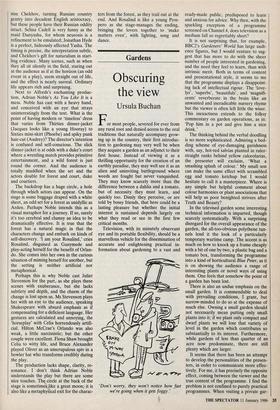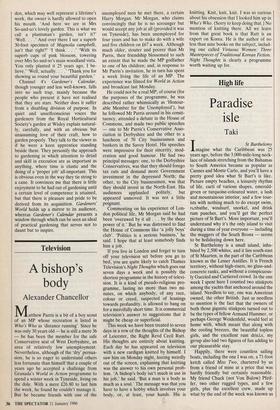Gardens
Obscuring the view
Ursula Buchan
For most people, severed for ever from any rural root and denied access to the oral traditions that naturally accompany grow- ing up in the country, their first introduc- tion to gardening may very well be when they acquire a garden as an adjunct to their first house. Instead of viewing it as a thrilling opportunity for the creation of an earthly paradise, they may well see it as an alien and uninviting battleground where weeds are fought but never vanquished. They may know scarcely more than the difference between a dahlia and a tomato, but of necessity they must learn, and quickly too. Dimly they perceive, or are told by bossy friends, that here could be a lasting pleasure but whether the initial interest is sustained depends largely on what they read or see in the first few critical months.
Television, with its minutely observant eye and its portable flexibility, should be a marvellous vehicle for the dissemination of accurate and enlightening practical in- formation about gardening to a vast and 'Don't worry, they won't notice how fast we're going when it gets foggy.' ready-made public, predisposed to learn and anxious for advice. Why then, with the sparkling exception of a programme screened on Channel 4, does television as a medium fall so regrettably short?
It is not surprising that, for example, BBC2's Gardeners' World has large audi- ence figures, but I would venture to sug- gest that has more to do with the sheer number of people interested in gardening, and the need they feel to learn, than with intrinsic merit. Both in terms of content and presentational style, it seems to me that the programme displays a disappoint- ing lack of intellectual rigour. The 'love- lys', `superbs', 'beautifuls', and `magnifi- cents' reverberate in the brain like an unwanted and ineradicable nursery rhyme but the viewer is often left little the wiser. This inexactness extends to the folksy commentary on garden operations, as in: `Pop him in a pot and give him a nice drink.'
The thinking behind the verbal doodling is no more sophisticated. Admiring a bed- ding scheme of eye-damaging garishness with, say, hot-red salvias planted in ruler- straight ranks behind yellow calceolarias, the presenter will exclaim, 'What a smashing splash of colour.' My small son can make the same effect with scrambled egg and tomato ketchup but I would hesitate to call it a masterpiece. Where is any simple but helpful comment about colour harmonies or plant associations that will help us poor benighted strivers after Truth and Beauty?
In the televised garden some interesting technical information is imparted, though scarcely systematically. With a surprising disregard for the overall appearance of the garden, the all-too-obvious polythene tun- nels lend it the look of a particularly temporary wartime camp. The accent is as much on how to knock up a frame cheaply with a bit of one by two, a plastic bag and a tomato box, transforming the programme into a kind of horticultural Blue Peter, as it is on showing the audience a range of interesting plants or novel ways of using them. One feels that somehow the point of a garden has been lost.
There is also an undue emphasis on the small garden. It is commendable to deal with prevailing conditions, I grant, but narrow-minded to do so at the expense of much else. Owning a small garden should not necessarily mean putting only small plants into it; if we plant only compact and dwarf plants we will lose that variety of level in the garden which contributes so substantially to its interest. Furthermore, while gardens of less than quarter of an acre now predominate, there are still plenty which are larger.
It seems that there has been an attempt to develop the personalities of the presen- ters, in order to communicate more effec- tively. For me, it has precisely the opposite effect, coming between the viewer and the true content of the programme. I find the problem is not confined to purely practical programmes. When visiting a private gar- den, which may well represent a lifetime's work, the owner is hardly allowed to open his mouth. 'And here we are in Mrs So-and-so's lovely garden. This is what we call a plantsman's garden, isn't it?' `Well. . . .' And over there I see a superb 30-foot specimen of Magnolia campbelli, isn't that right?' I think. . . ."With its superb cups of pink blossom, towering over Mrs So-and-so's main woodland vista. You only planted it 25 years ago, I be- lieve."Well, actually. . . ."Thanlc, you for showing us round your beautiful garden.'
Channel 4's Gardener's Calendar, though younger and less well-known, falls into no such trap, mainly because the people who present it have not realised that they are stars. Neither does it suffer from a disabling division of purpose. In quiet and unselfconscious voices the gardeners from the Royal Horticultural Society's garden at Wisley explain natural- ly, carefully, and with an obvious but unassuming love of their craft, how to garden properly. They talk to the viewer as if he were a keen apprentice standing beside them. They personify the approach to gardening in which attention to detail and skill in execution are as important as anything, where time is elastic and the doing of a 'proper job' all-important. This is obvious even in the way they tie string to a cane. It convinces me that there is little enjoyment to be had out of gardening until a certain level of competence is attained, but that there is pleasure and pride to be derived from its acquisition. Gardeners' World holds up a mirror to its audience, whereas Gardener's Calendar presents a window through which can be seen an ideal of practical gardening that serves not to daunt but to inspire.



























































 Previous page
Previous page